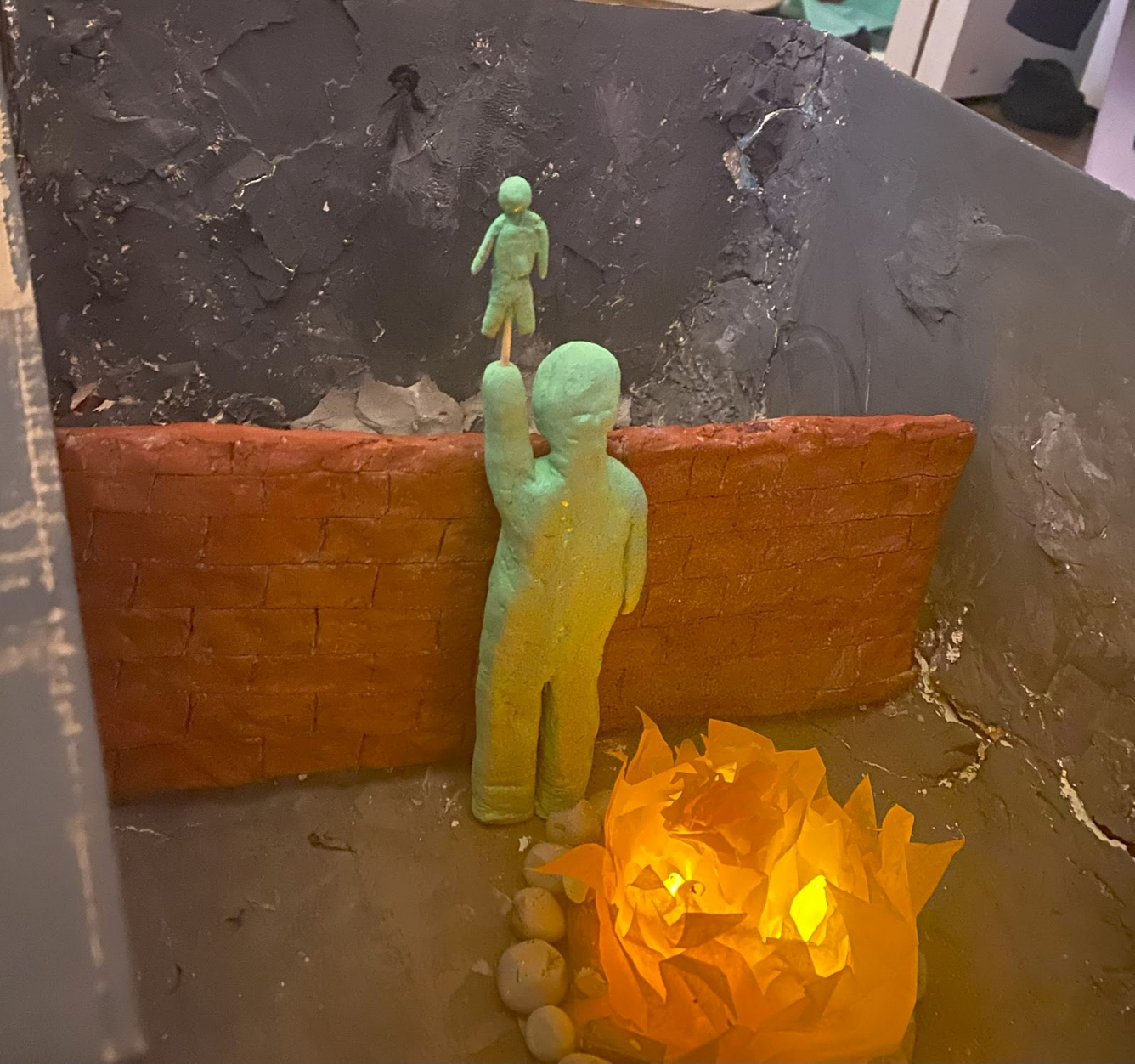 Menu
Menu
During her stay at the University of Dallas this summer, Fort Worth high school student Daniela Prado reconstructed Plato’s cave out of clay. She molded a figurine sitting against a brick partition, nestled tealight candles in orange paper made to look like flames and even daubed a shadow on the wall. The cave was part of her final project for UD’s College Citizens Program, an academically rigorous summer program at UD for rising high school seniors living in the Dallas/Fort Worth area.
Funded by the Teagle Foundation through a Knowledge for Freedom initiative grant, the College Citizens program asks students who would be the first in their families to earn a college degree to investigate what it means to be a citizen by using some of the texts in UD’s Core Curriculum to explore questions of responsibility and community.
“It’s a tightly-packed, interrelated selection of texts and topics that gives the students a crash course in the UD way of education — that is, approaching real world problems through great books,” said Matthew Berry, PhD, affiliate assistant professor of politics. “Teaching for the program was a demanding but rewarding experience.”
Prado’s multigenre project is one component of what makes College Citizens an all-encompassing experience: It challenges students to develop a final creative work that truly engages with the UD curriculum. In addition, students write personal journal entries or letters to family members and friends that offer a glimpse into the program. This encourages them to consider texts, provide quotations and supplement them concisely with the right amount of context. By the end of the program, they present their creative project and assemble a portfolio of their work.
“They have to be able to provide the intellectual basis for this creative project they’ve done and give their reasoning for what the relationship is between the creative project and the kind of intellectual formation they’ve had,” said Matthew Spring, PhD ’15, program director.
Now in its second year, the College Citizens Program ran parallel to the Arete Program this summer, with students in both programs attending the same extracurricular activities and reading many of the same texts. (On one occasion, College Citizen participants taught Arete students how to dance cumbia).
“We’re really fortunate with the students that we’ve had; they’re intellectually curious and eager to participate in class discussion,” Spring said.
Hannah Rogers, one of two grad mentors and a doctoral student in literature, saw the same qualities in the latest College Citizens group.
“This year’s cohort was intelligent, witty and thoughtful,” Rogers said. “The reading and writing they were assigned was challenging, but so many of the students worked hard, asked good questions and articulated interesting ideas about citizenship and community in general.”
During the program, students traveled to ancient Greece to encounter Plato, Aristotle and Sophocles; witnessed the Israelites’ exodus from Egypt; walked down to the Mount of Beatitudes to ponder Jesus’ teachings in his timeless sermon; and set off from Shakespeare’s Globe Theatre to the Americas. Nearing the end of the program, they marched alongside Martin Luther King Jr. and analyzed Malcolm X’s approach to the civil rights movement. Tirelessly dipping in and out of centuries and themes, students took a particular liking to Sor Juana Inés de la Cruz and Bartolomé de Las Casas, with whom many share a common language, said professor José G. Espericueta, PhD.
“A lot of our students come from Spanish-speaking backgrounds, and they mentioned how valuable it was to see and read some texts from Spanish-speaking writers. Sor Juana Inés de la Cruz essentially advocated for the liberal arts, and I think it can be empowering when students see how someone used an education to advocate for themselves,” said Espericueta, who also serves as chair of the Department of Modern Languages and Literatures.
“I also lead a class on Bartolomé de las Casas in which he speaks about the virtues of indigenous peoples. It’s a good text to read after reading Aristotle on natural slavery because de las Casas deals with contemporary justifications for slavery, asking, ‘Are the native peoples of the Americas slaves by nature? Can they be justifiably enslaved? Do they deserve the same rights?’ This is a complex text that students grappled with.”
UD faculty also gave guest lectures to help students tackle questions of faith and reason to better inform their understanding of the human condition.
“This is not a program to just recruit students to UD,” Espericueta said. “Rather, it’s teaching a valuable curriculum rooted in the great works of the Western tradition to students who may not have gotten it otherwise. And whether they come to UD or not, they will still have that to go on and do whatever they want to do.”